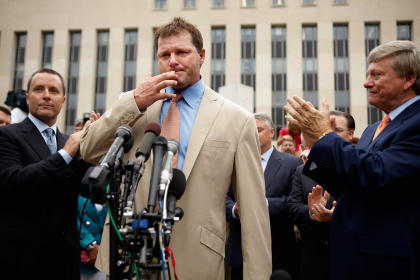Verdict in Roger Clemens' perjury case over his alleged steroids use yields no winners
Nothing that happened in Washington, D.C., on Monday will change the view of Roger Clemens. The majority of baseball fans will continue to believe he lied to Congress when he said he didn't use steroids. The verdict in his trial was never about the truth.
Rather, it was about a case that never should have seen a federal courthouse once, let alone the two times it did. And yet justice department lawyers pushed on and on for weeks, but all they ended up proving was they couldn't take the obsession of a few spotlight-seeking politicians and turn it into a conviction.
The government spent years investigating Roger Clemens. It sent detectives all over the country, interviewed dozens of people and probably spent millions of dollars. Here's what it came up with: an old beer can and a couple needles along with some cotton balls with Clemens' DNA that were provided by a sleazy ex-cop whose credibility has been shredded.

When Andy Pettitte – the one person who could buttress the government's argument with nearly certain memories of Clemens admitting HGH use – testified it was "50-50" that he remembered correctly what Clemens told him, the case was severely weakened. Later, testimony from the ex-wife of Clemens' top accuser, Brian McNamee, all but destroyed the government's hope.
It never could prove without a doubt that Clemens used steroids, nor was it ever going to.
This wasn't the case of a bad jury or the prosecution catching a bad break when Pettitte's testimony strayed from the script. This was a bad trial to begin with, one that only got worse as the public said it wanted to move on.
[Y! Sports Radio: What are chances an acquitted Roger Clemens makes Hall of Fame?]
Congress never should have entertained Clemens back in 2008 when he said he wanted to come to Washington and dispute the Mitchell Report. But by then Congress was in deep in the whole steroids and sports thing. The issue was too good to let go. When Sammy Sosa and Mark McGwire shriveled during a 2005 hearing, the positive attention that came Congress's way was too tempting not to continue. Here was a new audience, brought by a new medium – sports journalists – and the public was paying attention at a time when the public had long stopped paying close attention to what happened in Capitol Hill committee rooms.
Politicians looking for another starring role in front of the television cameras didn't have a clue what to do with Clemens once he contradicted what they'd read in the Mitchell Report. They pushed the case to the justice department and left the lawyers there to fight Clemens' attorney Rusty Hardin, who had managed to get the Supreme Court to overturn Arthur Anderson's obstruction of justice conviction.
The prosecution's first attempt to get Clemens blew up two days into the trial when the government's two prosecutors let jurors hear a recording of Pettitte's wife even after Judge Reggie Walton had ruled Pettitte's wife to be off limits. It almost seemed like a white flag from a prosecution team struggling to prove it had something.
When Walton declared a mistrial, the dismissed jurors signaled their agreement. Was the government really spending all this time and money on something so unnecessary?
Several times jurors fell asleep in the second trial. The judge said he understood. They were bored. Still, the government kept trying to prove something it never could. It dragged up unnecessary witnesses, droned on about the role of Congress and the need for hearings until the jurors seemed to check out. The fact it took the jury less than a day to come up with a verdict on six charges of obstruction of Congress, false statements and perjury says a lot about what it thought of the case.
This will probably mark the end of the government's reach into sports and steroids. Clemens' acquittal follows the slap on the hand received by Barry Bonds – two trials that took years to prosecute, cost tax payers millions and yielded little in return.
(Earlier this year, U.S. attorneys in Los Angeles dropped their Lance Armstrong investigation. And while USADA has levied charges against Armstrong, USADA's jurisdiction is far different. Armstrong could be stripped of his titles but won't go to prison.)
No, the public had grown tired of hearing about Clemens and steroids long before Monday afternoon's verdict. Clemens has been retired for several years. Aside from a positive test, evidence is always going to be circumstantial. The more his case dragged on, the clearer it seemed the government didn't have enough to convict him. Even the warnings by Walton in declaring last year's mistrial – that Clemens would get jail time if convicted – failed to add drama.
Because of a bad case, the pitcher walked.
The government didn't even offer a defense after the jury handed down its verdict, instead releasing a statement that thanked the jury, the investigators and the prosecutors.
It should have added a note of apology for twice wasting everyone's time with a case that was more about appeasing the egos of glory-seeking politicians and less about any real evidence.
Other popular content on the Yahoo! network:
• Slideshow: See the best photos from the weekend's sports action
• Winners and losers from an action-packed U.S. Open week
• Adrian Wojnarowski: Thunder's youth shows in Game 3 loss to Heat
• Y! Autos: Drag race ends with 0.0000 seconds between winner, loser

 Yahoo Sports
Yahoo Sports 